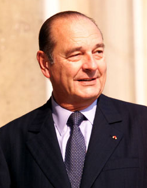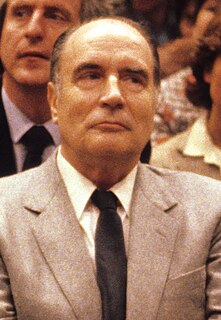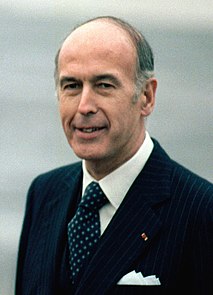| |||||||||||||||||
| |||||||||||||||||
 Results of the second round by department | |||||||||||||||||
| |||||||||||||||||
Presidential elections took place in France on 23 April and 7 May 1995, to elect the fifth president of the Fifth Republic.
Presidential elections in France determine who will serve as the President of France for the next several years.

The Fifth Republic, France's current republican system of government, was established by Charles de Gaulle under the Constitution of the Fifth Republic on 4 October 1958. The Fifth Republic emerged from the collapse of the Fourth Republic, replacing the former parliamentary republic with a semi-presidential, or dual-executive, system that split powers between a Prime Minister as head of government and a President as head of state. De Gaulle, who was the first French President elected under the Fifth Republic in December 1958, believed in a strong head of state, which he described as embodying l'esprit de la nation.
Contents
The Socialist incumbent president, François Mitterrand, who had been in office since 1981, did not stand for a third term. He was 78, had terminal cancer, and his party had lost the 1993 legislative election in a landslide defeat. Since then, he had been "cohabiting" with a right-wing cabinet led by Prime Minister Edouard Balladur, a member of the neo-Gaullist RPR party. Balladur had promised the RPR leader, Jacques Chirac, that he would not run for the presidency, but as polls showed him doing well and he had the support of many right-wing politicians, he decided to run. The competition within the right between Balladur and Chirac was a major feature of the campaign.
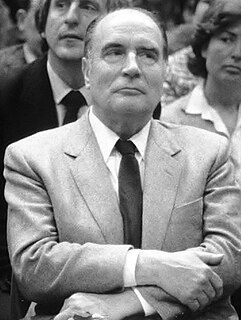
François Maurice Adrien Marie Mitterrand was a French statesman who served as President of France from 1981 to 1995, the longest time in office in French history. As First Secretary of the Socialist Party, he was the first left-wing politician to be elected President of France under the Fifth Republic.
Cohabitation is a system of divided government that occurs in semi-presidential systems, such as France, when the President is from a different political party than the majority of the members of parliament. It occurs because such a system forces the president to name a premier that will be acceptable to the majority party within parliament. Thus, cohabitation occurs because of the duality of the executive: an independently elected President and a prime minister who must be acceptable both to this president and to the legislature.
Meanwhile, the left was weakened by scandals and disappointments regarding Mitterrand's presidency along with the Unemployment rate hovering around 10%. In June 1994, former Prime Minister Michel Rocard was dismissed as leader of the Socialist Party (PS) after the party's poor showing in the European Parliament elections. Then, Jacques Delors decided not to stand as a candidate because he disagreed with the re-alignment on the left orchestrated by new party leader Henri Emmanuelli. This left the field wide open for numerous potential candidacies: among those who are known to have considered a run, or were strongly urged by others, are Jack Lang, Pierre Joxe, Laurent Fabius, Ségolène Royal and Robert Badinter. Former party leader and education minister Lionel Jospin was chosen by PS members as the party's candidate in a primary election pitting him against Emmanuelli. He promised to restore the credibility and moral reputation of his party, but his chances of winning were seen as being thin. The economy was also still struggling with a depression which began in mid-1990, and the government's policies were widely blamed for both the recession and its slow recovery.

Michel Rocard was a French politician and a member of the Socialist Party (PS). He served as Prime Minister under François Mitterrand from 1988 to 1991, during which he created the Revenu minimum d'insertion (RMI), a social minimum welfare program for indigents, and achieved the Matignon Accords regarding the status of New Caledonia. He was a member of the European Parliament, and was strongly involved in European policies until 2009. In 2007, he joined a Commission under the authority of Sarkozy's Minister of Education, Xavier Darcos.

Jacques Lucien Jean Delors is a French politician who served as the 8th President of the European Commission from 1985 to 1995. He served as Minister of Finance of France from 1981 to 1984. He was a Member of the European Parliament from 1979 to 1981.
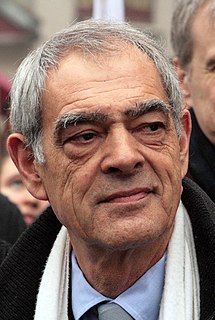
Henri Emmanuelli was a French politician. A member of the French Socialist Party, he was deputy for Landes from 1978 to 1981, from 1986 to 1997, and from 2000 to 2017.
The French Communist Party (PCF) tried to stop its electoral decline. Its new leader Robert Hue campaigned against "king money" and wanted to represent a renewed communism. He was faced with competition for the far left vote by the Trotskyist candidacy of Arlette Laguiller, who ran for the fourth time. Both of these candidates had a better result than their parties had in 1988, but came nowhere near being able to participate in the next round. In choosing Dominique Voynet, the Greens opted for their integration with the left.
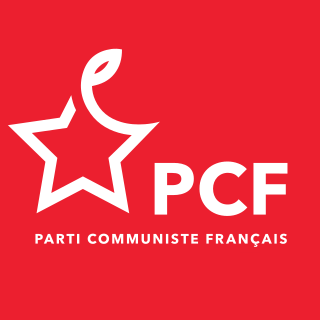
The French Communist Party is a communist party in France.

Robert Hue, in full Robert Georges Auguste Hue, is a French politician who was National Secretary of the French Communist Party (PCF) from 1994 to 2001 and President of the PCF from 2001 to 2002. He served as a Deputy in the National Assembly of France from 1997 to 2002, and he has served in the Senate of France since 2004.

Arlette Yvonne Laguiller is a French Trotskyist politician. Since 1973, she has been the spokeswoman and the best known leader and perennial candidate of the Lutte Ouvrière (LO) political party. Known to most French people simply by her first name, Laguiller is committed to the cause of the Communist revolution.
On the far-right, Jean-Marie Le Pen tried to repeat his surprising result that he obtained in the 1988 presidential election. His main rival for the far-right vote was Philippe de Villiers, candidate of the eurosceptic parliamentary right. Both candidates primarily focused over the financial situation.

Jean-Marie Le Pen is a French politician who served as President of the National Front from 1972 to 2011. A Member of the European Parliament (MEP) since 2004, he had previously been elected to the same position between 1984 and 2003. He also served as Honorary President of the National Front from 2011 to 2018.

Philippe Marie Jean Joseph Le Jolis de Villiers de Saintignon, Viscount de Villiers, known as Philippe de Villiers, is a French entrepreneur, politician, and novelist. He is the founder of Puy du Fou, a theme park. He was the Mouvement pour la France nominee for the French presidential election of 2007. He received 2.23% of the vote, putting him in sixth place. As only the top two candidates advance to the second round of voting, he was eliminated from the race. Before and after the election, Villiers has been internationally notable for his criticism of Islam in France.
In January 1995, when he announced his candidacy, Balladur was the favourite of the political right. According to the SOFRES polls institute, he held an advantage of 14 points over Chirac (32% against 18% for the first round). He took advantage of his "positive assessment" as Prime Minister and advocated a moderately liberal economic policy. Chirac denounced the "social fracture" and criticised the "dominant thought", targeting Balladur. Chirac argued that "the pay slip is not the enemy of employment". Indeed, unemployment was the main theme of the campaign. From the start of March, Chirac gained ground on Balladur in the polls. Another factor that contributed to Balladur's fall in popularity was the revelation of a bugging scandal which had implicated Balladur. [1]
Chirac's campaign slogan was "La France pour tous" ("France for everyone"); Balladur's "Believe in France"; and Jospin's "A clear vote for a more just France".
